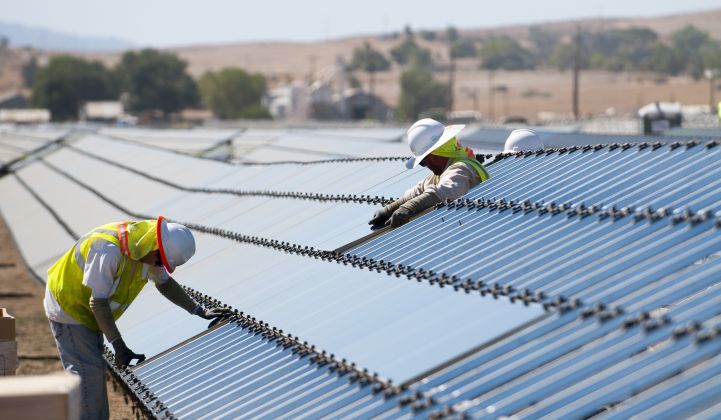First Solar has inked a deal to supply 1.7 gigawatts of its solar modules to Intersect Power, as solar manufacturers and U.S. developers race to push through projects in advance of the wind-down of federal Investment Tax Credit.
Tuesday’s announcement, made during the first day of the Solar Power International conference, marks the biggest order yet for the Arizona-based solar manufacturer's Series 6 larger-format thin-film solar modules. They’re bound for five projects being developed by Intersect Power and built by Signal Energy in Texas and California.
Deliveries are to begin in the fourth quarter of 2020 and continue through the end of 2021. That would mean the modules themselves would likely be ineligible for the full ITC. U.S. solar industry advocates are pushing for an extension of the ITC, saying it could further boost solar’s already fast-growing cost advantages against dirty generation resources.
It’s a massive new order for First Solar, which reported in an August quarterly earnings call that it had booked 4.3 gigawatts so far in 2019, up from 2.3 gigawatts reported in its previous earnings call. First Solar reported an $18.5 million loss for the second quarter, an improvement from the first quarter’s $67.6 million loss, with increases in operating costs offsetting boosts in module and systems revenue.
First Solar’s thin-film cadmium telluride solar panels have had a competitive advantage against many foreign-made modules under the Trump administration’s 30 percent tariff on imported crystalline-silicon PV cells and modules. But this competitive advantage has been eroded somewhat by the administration’s exemption of bifacial modules from the Section 201 tariffs.
Canadian Solar landed a 1.8-gigawatt contract with EDF Renewable Energy in May, including both traditional modules and bifacial modules, which generate more electricity than traditional modules by absorbing sunlight on their back side.
First Solar has also made strides in the expanding commercial and industrial solar market, including deals to supply Microsoft data centers in Arizona, a Facebook data center in Utah, a California cattle ranch and a Kellogg’s Australia manufacturing facility.
The modules are headed to two of the country’s fastest-growing solar markets. California has long been the country’s leader in utility-scale solar, while Texas has been growing in attractiveness due to its transmission infrastructure to support its massive wind power sector and its lucrative, if volatile, energy markets.
Chattanooga, Tenn.-based Signal Energy announced Tuesday that it plans to build three merchant solar plants in Texas — a 425-megawatt farm in Borden County near Midland, set to start construction in February 2020; a 375-megawatt project in Culbertson County near El Paso, set to start in March 2020; and a second 250-megawatt project near El Paso set to begin in June. It also has plans for two projects in California’s Riverside County, totaling 650 megawatts, set to begin in June and October 2020.




